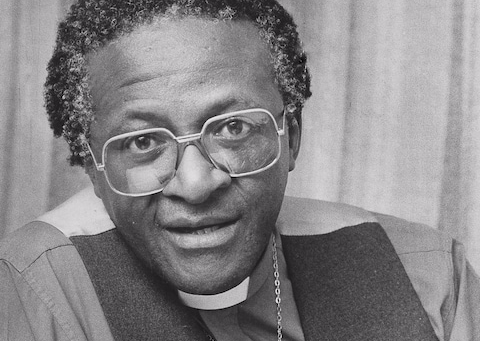Mpilo
Desmond Mpilo Tutu was born on October 7, 1931, in Klerksdorp, South Africa. Both of his parents worked in education. His mother cooked and cleaned at the local school for the blind and his father was the principal for an elementary school. Although South Africa was segregated much like the American South, Tutu managed to have a fun childhood.
Education
As a child, Tutu enjoyed reading comic strips, Aesop’s Fables, and Shakespeare’s plays. As a teen, he contracted tuberculosis. He spent the next year in a sanatorium. While battling the disease, he decided to pursue a career in medicine in order to find a cure for it. He attended Johannesburg Bantu High School, an all-Black, underfunded school. There, he excelled.
Tutu graduated from high school in 1950. He was accepted into medical school but could not afford the tuition. He then accepted a scholarship to Pretoria Bantu Normal College where he studied teaching. After graduating in 1953, he then set out to earn his B.A. from the University of South Africa.
Career and Activism
Upon earning his B.A., Tutu returned to his high school and taught English and History. As the oppression of apartheid grew stronger, he grew angrier at the system. In 1953, the government passed the Bantu Education Act. This act lowered the education standards for Black students in South Africa. Black students were only taught what was necessary to work as domestics. Enraged by the education system, he quit teaching in 1957.

Theology
In 1958, Tutu began his higher education at St. Peter’s Theological College in Johannesburg. By 1960, he was an ordained Anglican deacon and an ordained priest by 1961. In 1962, he traveled to London where he continued his theological studies. He earned his Master’s of Theology degree from King’s College in 1966.
Theology Career
After four years abroad, Tutu returned to South Africa. He taught at the Federal Theological Seminary at Alice in the Eastern Cape. Simultaneously, he served as the chaplain of the University of Fort Hare. In 1970, he was a lecturer in the department of theology at the University of Botswana, Lesotho, and Swaziland in Roma. After two years, he returned to England. There, he continued to serve as an educator.
Notoriety
In 1975, Tutu rose to prominence in his career. He became the first Black Anglican dean of Johannesburg. Also noteworthy is the fact that he was the most eloquent leader of the anti-apartheid movement. Most of the other leaders had been imprisoned or exiled for their political views and activism.
Later Years
Throughout the 1980s and 1990s, Tutu continued to fight for justice and equality around the world. He retired from the public image in the late 1990s but continued to speak out against injustices in the world. At the age of 87, Desmond Tutu lives happily with his wife of 63 years.

**The views and actions of the DDH historical figures that are featured may not reflect the views and beliefs of Ramiro The Writer or We Buy Black. Thank you.**
]]>








